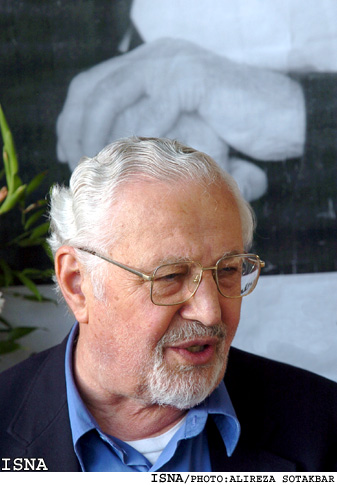September 01, 2017

Ebrahim Yazdi, who was one of the handful of western-educated laymen who aided Ayatollah Khomeini in Paris during the revolution and was briefly foreign minister after the revolution, has died of cancer at 86, Iranian media reported Monday.
He died late Sunday in Izmir, Turkey, where he underwent surgery for prostate cancer. Tehran news reports said the United States had refused his request for a medical visa. However, Yazdi was a dual citizen and did not require a visa.
Yazdi lived in the United States from 1961 to 1978 and most of his children remain there. He was a professor of pharmacy at Fairleigh Dickinson University in New Jersey and later conducted postdoctoral work in molecular genetics at Baylor University in Texas.
He left there in 1978 to join Ayatollah Khomeini in Paris as one of the group of Western-educated men who became assistants to Khomeini and helped interpret him for the Western media. All were subsequently purged and one, Sadeq Ghotbzadeh, was executed.
Immediately after the revolution, Khomeini named Mehdi Bazargan as prime minister. Yazdi became deputy prime minister in February 1979 and then foreign minister in the summer of 1979. He resigned with Baz-argan and the rest of the cabinet immediately after the US embassy and its staff were seized November 4, 1979, and Kho-meini declined to order the students out of the embassy compound.
Yazdi then became active in the Liberation Movement of Iran (LMI), which had been founded in 1963 by Bazargan. Yazdi took over as leader of the LMI after the death of Bazargan in 1995.
The party had been declared illegal soon after it left the government in dispute over the embassy seizure. It was barred from publishing its newspaper and its meetings were sometimes broken up violently. But the regime freely allowed foreign reporters and scholars to interview Yazdi.
The party’s main activity under Yazdi was to lobby for fully free elections and campaigning. He repeatedly said the governing system fell far short of democracy.
In an interview in 1997 with The New York Times, Yazdi was asked if he felt safe making such remarks. He said, “Not very much, but we feel this is our country, and no one can claim to be more revolutionary or Islamic than I am. I stay inside the country in order to say these things.”
Yazdi was repeatedly jailed by the regime. He was last freed at Now Ruz in 2011 when he was a few weeks short of 80 and was the oldest person known to be held political prisoner in Iran. On release, he promptly resigned as leader of the Liberation Movement of Iran.
It appeared that the resignation was a requirement for Yazdi’s release, but neither the government nor Yazdi specifically linked the two.
After about 2000, the regime landed hard on Yazdi and his party with the clear intent of putting him and the party out of business.
The party advocated social democratic principles with an Islamic cast. It was distinguished from the many other anti-Shah parties in the 1970s by its opposition to secularism.
The offense that appears to have caused Yazdi’s last imprisonment and conviction was an open letter to Rachid Ghan-nouchi, the leader of the mildly Islamist Tunisian political party, Ennahda.
In that letter, Yazdi cautioned Ghannouchi not to repeat the errors Iran made after its 1979 revolution. Yazdi also commented in that letter that he didn’t believe Muslims had enough experience with democracy to make it work.
“We fight and overthrow dictators—but not dictatorship itself. Despotism is not just a political structure; it has its corresponding social and cultural dimensions, which enable it to persist and become ingrained in individuals and whole societies afflicted by despotism for a long time.
“The result is that we Muslims overthrow despots often, only to see new ones replace them. This is indeed what has befallen us in Iran. We deposed the Shah, but neglected to address the shah-personality within our own selves. Thus, the vicious circle continues,” he wrote.
Yazdi refused to defend himself at his trial, refusing to accept that the court had jurisdiction over him when the Constitution says political crimes should be tried by a jury in an open court.
On another occasion, Yazdi said the bragging of some “rightists” in Iran that the country was set to become a Muslim version of China was wishful thinking. To become successful like China, claimed Yazdi, three components are necessary: “economic development, social freedom and political expression.”
But, he said, “The Iranian authorities are only equipped for suppression. Social freedoms in China—like freedom for boys and girls to get together—are no problem in China, as long as they don’t involve anything political. The dress code was never an issue [in China]. The Iranian government, on the other hand, keeps hammering on Islamization of social behavior. Even novels are censored—there is no kissing in novels published in this country.”
China has been so successful, said Yazdi, because “the Chinese divorced themselves from the Cultural Revolution…. The Communist Party decided to remove any ideology. Only nationalism remained. Can Iranian authorities divorce themselves from Islam? No. They do have a problem.”